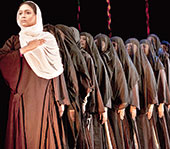
Chandan Sen's 70th birthday occasioned celebrations in the Bengali theatre community, for whom he has written innumerable plays over several decades. As it so happens, two of his new compositions are on view, by Sayak, a group that has a long association with him, and by his own Ha-ja-ba-ra-la, based in Chakdah. Both share the theme of female empowerment, a cause that he has regularly championed of late.
He dramatized Sayak's Damini-he from the fiction of award-winning novelist Amar Mitra, specifically the short story "Akal". In a poor, remote backwater, the young Damini serves virtually as a caregiver to three generations of ineffectual, doddering men: her progeriac 40-year-old husband, his 75-year-old father and his centenarian grandfather. She wangles government dole for them, using her charm to achieve her ends while keeping her dignity. The apparently social drama reaches symbolical levels in an almost preternatural climax prophesying nature's fertility against male impotence.
Damini's character obviously holds the centre, and Kathakali Deb (picture), who has matured remarkably in her brief career, gives it an indomitable strength. But as always when Meghnad Bhattacharya directs, the supporting roles receive equally adept portrayals - from Papiya Roy as an exploited villager to the three geriatrics (in descending seniority, Biswanath Roy, Pradip Das and Uttam De) and the three powerful men (Subrata Bhawal as panchayat head, Dhurjati De as block development officer, and Bhattacharya himself in an untypically small part as a local procurer). Saumik-Piyali's set of a sprawling banyan dominates the stage with its eerie antirealism, dwarfing the destitutes who live under its canopy.
Likewise eponymously titled, Ha-ja-ba-ra-la's Jahanara Jahanara also starts with a non-urban scenario, of a Muslim slum-dweller from Canning who commutes to Calcutta. She changes in the ladies' toilet at Ballygunge Station into traditional saris because she works as a maid under the name of Juin Banerjee for a Brahmin family whose patriarch relies on her for his daily puja, forbidding his lower-caste daughter-in-law. Every evening, moonlighting in shady pursuits at home, Jahanara must protect her own daughter from the clutches of traffickers. Sen constructs this play somewhat melodramatically, as things come to a head before she saves the day, but he successfully satirizes the supposedly enlightened bhadralok society.
Bindia Ghosh, who seems recently to specialize in oppressed, self-liberating heroines from marginalized backgrounds, excels as Jahanara, whose double life allows her to practically enact two contrasting lead roles in one, showcasing all her skills. Sen's direction authentically recreates the seedy slums and their residents, and elicits particularly well-etched performances from the other actresses, Ritu Chakraborty and Aditi Lahiri.










